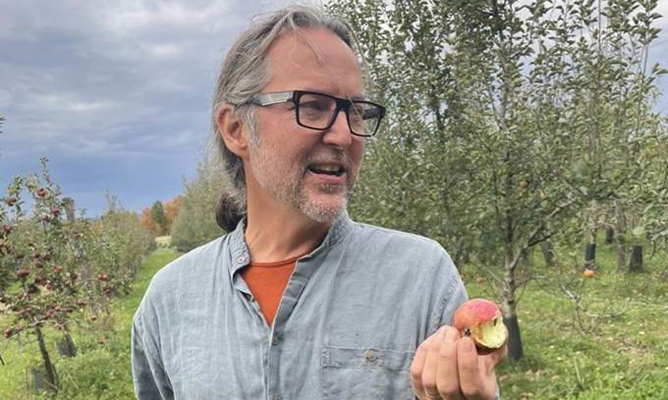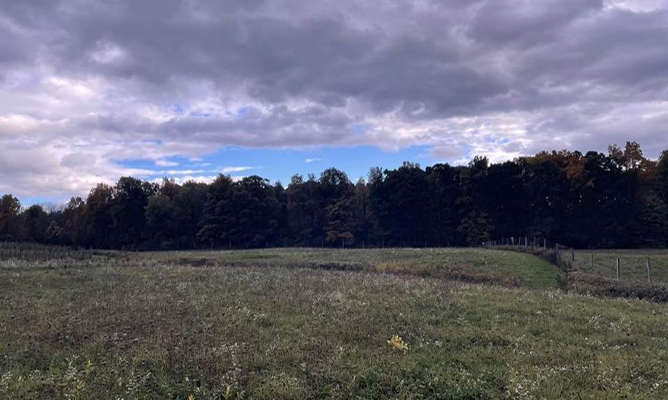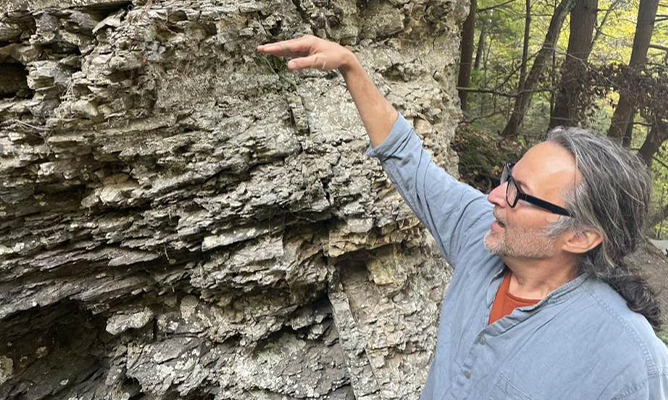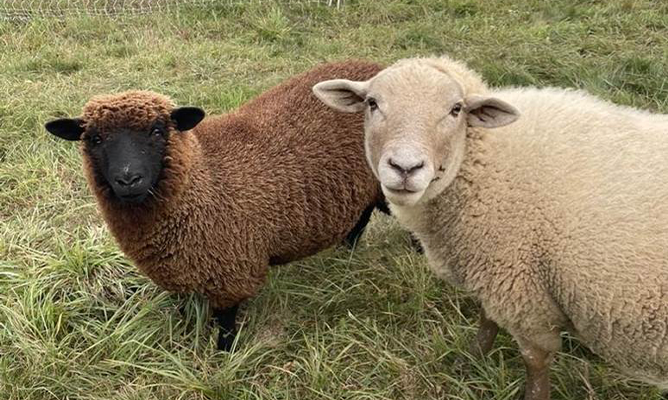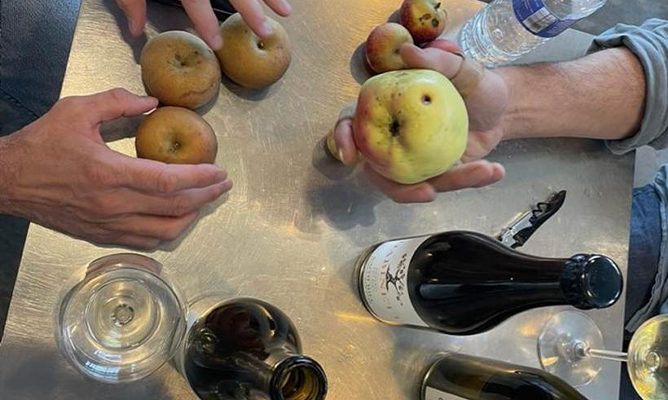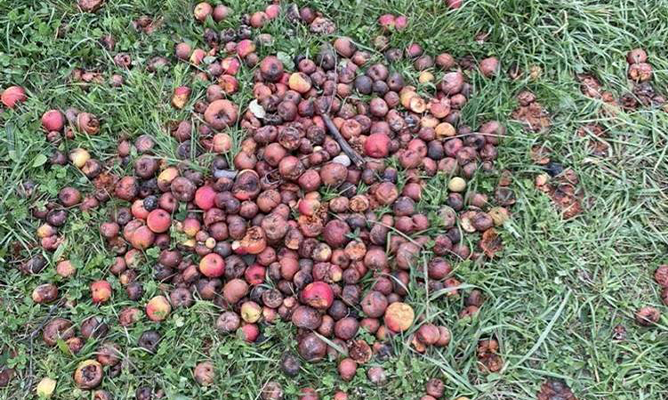South Hill
About
The secret to Steve’s success is that, at its core, South Hill isn’t really about apples or, for that matter, grapes. Instead, the fruit is just a medium to explore the omni-present slate that defines the Finger Lakes. Steve’s orchard and his best foraging areas are on thin topsoil on top of thousands of layers of thin sheets, densely packed and crackling with potential energy and acid. These rocks have held a fascination for Steve for his entire life – he recalls spending time in high school staring at slate formations and “pondering the meaning of millions of years.” South Hill began with just the fruit Steve could glean from the many state parks surrounding Ithaca, with wild apples uniquely specialized to the area – either from orchards that had gone feral or from pippins deposited by animals. Some of these, Steve maintains, are perfect at transmitting the local terroir, including one massive and ancient tree in the middle of a cow pasture nearby that Steve harvests, ferments and bottles separately as a single tree cider. Being situated on parkland, none of these trees have been sprayed, cared for or even monitored for decades, growing completely at the whims of the environment.
Mostly, the environment seems to favor apple trees, however, when the 2012 polar vortex frost wiped out the wild apple crop, Steve turned towards the Cornell orchardists and the “local old-timers,” and “discovered what farmed fruit can do.” “From there,” Steve told us, “ I wanted to have an orchard as my own laboratory.” Steve grows 30 varieties of apples on his 20 acres, and maintains cuttings from his favorite trees on his foraging route. In addition, he’s planted 500 seedings from wild trees in a test orchard for future varietal selection. Tucked away in a corner of his orchard, Steve has planted several acres of Marechal Fochs, a French-American hybrid grape that he sees a big future for in the FLX. All these are grown without synthetics and lovingly maintained by hand and, for mowing and fertilizing purposes, by flocks of sheep.
While it’s hard to summarize such a prolific producer (Steve makes well over 2 dozen cuvees, many of which are ephemeral or just for local consumption), there are very clear through lines in his work. Chief among these are the presence and weight of the apple tannins Steve is able to coax out of the wild fruit or the intentionally farmed bittersweet apples he favors. For those used to light, fizzy and low alcohol American ciders, South Hill is nothing short of revelatory. South Hill ciders generally all approach 7-8% alcohol with a notable tannic presence. Rather than clear and transitory, South Hill ciders tend towards golden or brown colors with a distinctive snap and weight. It would be easy to just call these “red wine people ciders” and be done with that, but really, Steve’s ideal is the weight and brioche and gravitas of his favorite champagnes (He’s in a Krug period currently) and his deep reverence for the gnarl and zip of the underlying bedrock. They feel, at least to us, like they should be required drinking for the panoply of anemic tasting riesling makers in the area, offering a thrilling alternate vision of a terroir with the capacity to be both noble and novel.
Products

Bluegrass Russet Cider
Sustainable. This cider showcases the Golden Russet apple, a native apple to New York, historically prized for it's excellent flavor in cider and on the table. Custom fermentation and bottling using Charmat method. Naturally Sparkling, Off-dry.

Pommeau
South Hill Pommeau is a blend of barrel-aged Apple Spirits (Eau de Vie) with unfermented and unfiltered apple cider. During months of aging, the pommeau naturally clarifies to an amber liquid of exquisite character. Think Port-style cider. RS 10.1% / 19% ABV


Prelude Cider
Organic. 65% Heirloom apples (Newtown Pippin, Baldwin, Rhode Island Greening, Baldwin, Macintosh, Golden Russet) and 35% Bittersweet (Harry Masters Jersey, Geneva Tremlett’s, Dabinett, Ellis Bitter). Long maceration, elevage and bottle time make this a razor sharp and bone dry ancestral. Unfined, unfiltered.

Cosmos Transformed
Biodynamic. Traditional method sparkling, fully grown from South Hill’s home orchard, which is planted on shale bedrock with no synthetic inputs used in farming. Biodynamic preparations have been used since the orchard’s planting in 2014. 21% Calville Blanc, 18% Goldrush, 16% Dabinett, 12% Sam Young, 10% Ashmead’s Kernel, 7% Golden Russet, Porter’s Perfection, 7% Michelin. 0g RS, vintage 2021. Unfined, unfiltered, no added SO2.

Sunlight Transformed
Organic with biodynamic preparations. Pet-nat method. Co-ferment of Dabinett apples and Cabernet Sauvignon skins. Spontaneous fermentation for 120 days. Bone dry. Unfined, unfiltered, no SO2 added.

Geneva Jersey
Dry, sparkling, wild-fermented bittersweet apples. Fruit from the Greene Farm orchard in Wolcott, NY. Traditional method, with a long, slow un-inoculated base ferment which took 100 days to complete. No SO2 added. 48% Dabinett, 36% Chisel Jersey, 7% Golden Russet, 6% Geneva Bitter. 0g RS. Citrusy aroma, savory with a lively bubble, notes of clementine, juicy mandarin, candied ginger.
Marechal Foch Pet Nat
Sustainable. 100% Marechal Foch, a cold-resistant teinturier hybrid from Alsace. Cidermaker Steve Selin has long been curious about making wines from grapes, and this "experiment" turned out better than we all could have expected. Based off of this wine, he's planted several acres of the Marechal Foch near his home orchard. WIld fermented in steel and bottled with residual sugar to make an ancestral. Absolutely captivating.
String Theory Cider
Organic. A love letter to bittersweet apples: 53% Chisel Jersey, 47% Dabinett. This cider takes as inspiration Breton and Norman cider traditions: wild fermented, semi-dry and slightly lower alcohol levels. Bottled as an ancestral in late 2024.






